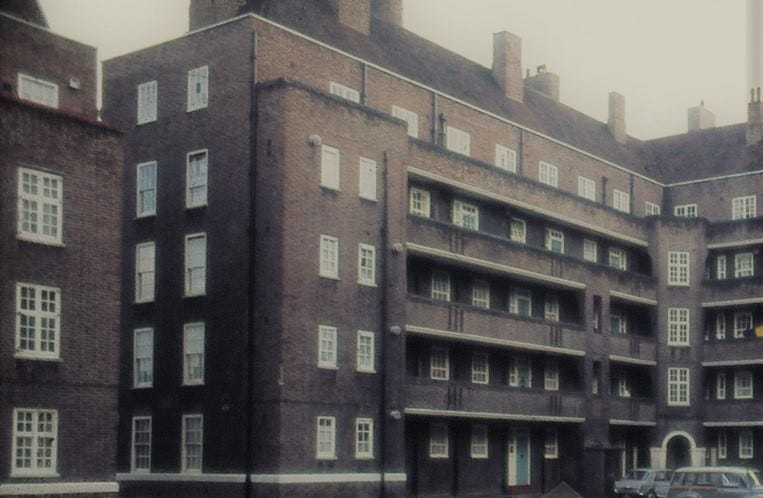London Culture
After thinking about what London culture meant to me, having grown up there from the 1950s until the mid-nineties, memories of food and music began to dominate my thoughts and became the forces driving this piece of writing.
The house I was born in, 8 St. Oswald’s Place, was compulsorily purchased by the local council as part of the Post War Slum Clearance Campaign. Because my Mum owned the lease of the house, she fought and managed to get slightly more than the one-pound sterling initially offered. We moved into a block of council flats nearby.
Our old house did not have electricity, and I don't recall hearing any music there. My earliest memory concerning food was of an elderly neighbour Mrs Fairman, a widow who always dressed in black. I remember her saying that she was going to buy me a cake. I was about three at the time and can remember one of my sisters telling me that Mrs Fairman was a witch, just like the one in the Hansel and Gretel fairytale, who tempted children with cakes and sweet things and then ate them. The thought of that scared me, so from then on, whenever I sat outside unrestrained in my pushchair and saw her leave her house, I would jump out and run inside, looking out the window until she had passed. Mrs Fairman died shortly after, and I remember thinking about the cake I would never get to eat but feeling relieved that I wouldn't get eaten either.
Life was different in the flats from life in the old house. There was electricity, so we got a TV with radio stations, and a record player.
Weekends were all about food, music, and entertainment.
Saturday morning meant Saturday morning pictures, where we were known as the Kennington Grenadiers and sang along to popular songs of the time, assisted by lyrics projected onto the screen. Afterwards, we would head straight to the Pie and Mash shop and from there on to Marcantonio's Cafe for a cone of authentic Italian ice cream. That was Saturday sorted.
Sunday was 'roast dinner day', and from preparation to serving, the Billy Cotton Band Show and the Clitheroe Kid would be blasting out of the radio whilst mum worked away in the small scullery preparing the dinner. When we heard mum sharpening the carving knife on the stone step outside, we knew then that dinner was imminent. As a trained cook, she had everything under control, including the lighted cigarette dangling from her mouth, complete with long ash, which none of us ever saw fall.
After dinner, there was little movement from us as we watched and listened to the Liberace Show on our small black and white TV. Tea time would be a light affair with tinned salmon and cucumber followed by a tin of peaches or fruit cocktail with Carnation Milk and jelly. After a slice of mum's Victoria Sponge, we'd settle down in front of the TV for our last piece of entertainment, Songs of Praise, with the volume turned down, laughing at the expressions on the congregation's faces as they belted out hymns. The only exception was when mum's favourite singer Harry Secombe was on when she would say, “you can turn him up”.
In Ireland, we would say that we were " On the pig's back." Harold McMillan told us back there and then, "You've never had it so good".
My mother footed the bill for the weekend indulgences by working 2/3 jobs, so we saw very little of her through the week. My elder sister made porridge for breakfast, and school dinners provided our main meal.
I remember a conversation with an in-law who had responsibility for the school meal budget for a whole county in the West of England. I told them how good it was to have had a hot, nutritious meal provided by the state for the equivalent of 5p, plus free milk and cod liver oil capsules.
Their opinion was that it was to build up the post-war generation. That was probably true, but at the time, it made me feel important and that my welfare mattered.
I attended St Peter's Church of England School' high church', which meant a lot of hymn singing and Latin during the weekly church service.
During the week, my class listened to and sang along to the BBC radio series 'Singing Together." Most of the "Singing Together" songs were folk and had no relevance to my life. My class teacher at the time Miss Long, changed all that in 1960, when Lonnie Donegan's skiffle band had a big hit with 'My Old Man's a Dustman.' Miss Long was on playground duty one day and started singing the song and encouraged the children to form a line of pairs with two children forming an arch that changed at the end of every chorus. She joined in with us, marching along to the singing.
It was brilliant to have a song about people from our backgrounds endorsed by our teacher, who was terrific. She taught me to read, knew whenever it was a child's birthday, would light candles for them, and the whole class would join in singing happy birthday to them.
If our work reached her (high) standard, Miss Long would praise it to our peers. She was never sarcastic and even took a group of children (including me) to the Lord Mayor's show on her day off. Miss Long brought colour and light to our lives. I can only recall one occasion when Miss Long expressed disgust or disappointment in us when she told us that it looked as if someone had blown their nose on the pull-down towel in the toilets.
I have very few memories and no photographs of my Dad, but I remember a quiet, dignified man who carried himself well, always wore highly polished brogues and liked a drink.
I have two distinct memories of being alone with him.
First is being in the scullery, watching him as he prepared lamb stew. He was peeling potatoes, and I asked why the potatoes had eyes. "So they can see where they are growing", was his reply.
The second was when I was in the living room dancing 'The Twist' to Chubby Checker's hit song "Let's Twist Again". I happened to look up and saw my dad watching and smiling silently in the doorway.
For reasons that would become clearer to me later, my parents' relationship deteriorated after we moved into the flats. It was difficult for us when they eventually stopped speaking to each other.
Another memory I have is of us rushing into his room after he'd left for work on a Friday, which was his payday. He would always leave four equal amounts of pocket money, plus a bar of chocolate to be shared amongst us.
I was a surprise baby conceived when my mother was 38 and experiencing premature menopause. Mum told me later that was why my Dad started night work.
For all the records mum bought, dad bought one. It was called Telstar by The Tornadoes and was a major hit on both sides of the Atlantic in 1962.
Dad died from tuberculosis at the age of 61. A week after he died, a letter arrived informing him that the final payment of the Bush transistor radio purchased on HP had been received and that the radio now belonged to him.
Life changed in many ways after my Dad died. I left St Peter's School in July 1963, started secondary school in September, and my Dad died in October. As well as being extremely traumatic to witness, my Dad’s death would reveal truths that proved life-changing and resulted in the complete disintegration of our family.
Following his admission to the South Western Hospital, Lambeth, I never saw my Dad during the weeks leading up to his death. The seriousness of his medical condition only became apparent when I heard an SOS message had been broadcast by the BBC, informing the family of Leonard Ward that he was dangerously ill. There was no response to the broadcast, but shortly after his death, his wife, the lawful Mrs Ward, stepped forward to claim a Widow's Pension, revealing the first hidden truth.
A consequence of this revelation meant that my Mum was responsible for the funeral expenses but was ineligible to claim any of the costs incurred. I remember her being extremely upset after the funeral ( I wasn't allowed to attend), exclaiming that it had been a paupers funeral. I had no idea what that meant at the time, but I knew from her that it must have been an awful thing to experience. A further revelation was one my Dad made to a nurse on duty the night he died. He confessed to her that he was a wartime deserter from the British Army. He was delirious at the time, but this revelation explained a lot. Though my Mum rightly pointed out that the Queen had pardoned all deserters. The fact was that after deserting, he'd gone on to have another family with Mrs Waud, a widowed mother of two, which would have made it difficult to go back to his previous life and would explain his reluctance to speak about his past.
Another discovery that surprised us was when we cleared his few personal possessions from a chest of drawers in his room. One drawer contained a neatly folded hammer and sickle flag, another a rusty old sword and scabbard. Dad and mum both took many secrets to the grave.
To set this in its musical context. It was when a new band from Liverpool called The Beatles came storming onto the music scene. At 12 years of age, I was a fully paid-up member of the Beatles' official fan club. I had a lot to scream about and did!





